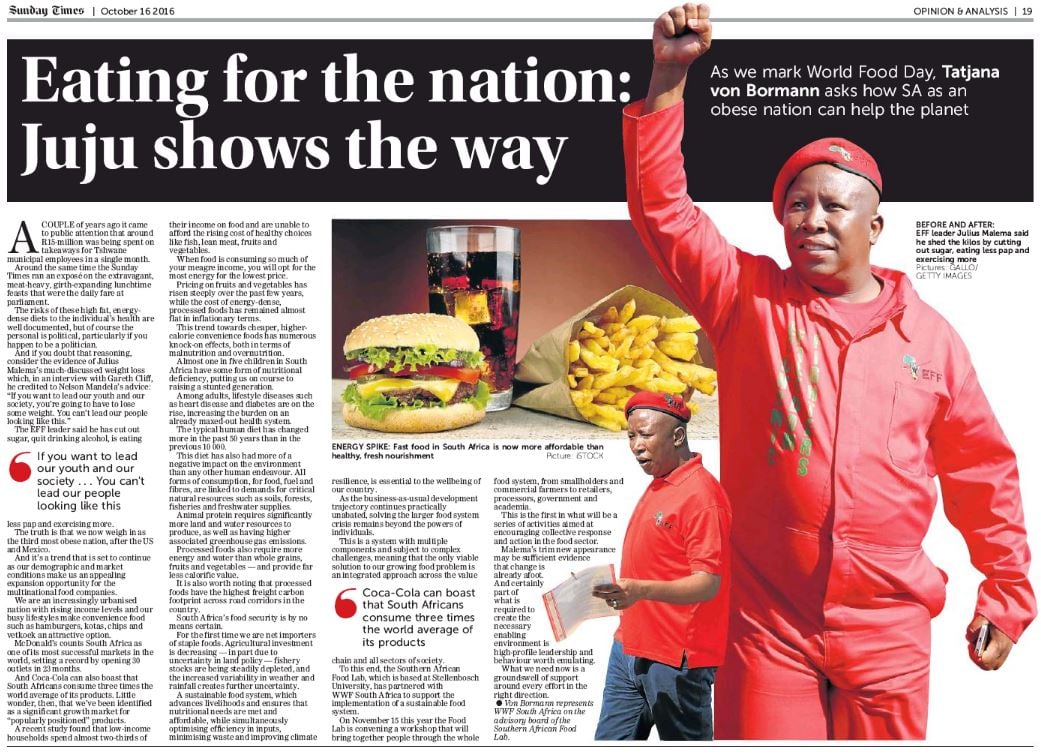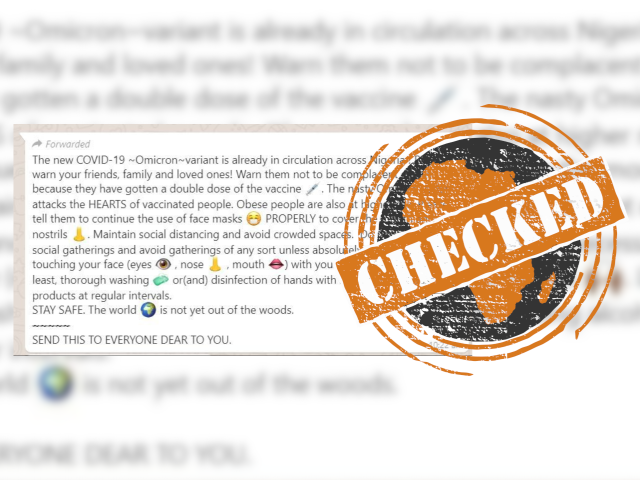This article is more than 7 years old
Highlighting politician Julius Malema’s behaviour as worth emulating - his eating habits, that is - a member of the South African food lab’s advisory board encouraged South Africans to follow a healthy diet.
Writing in the Sunday Times, Tatjana von Bormann argued that South Africa needed to implement a sustainable food system, especially since South Africans “now weigh in as the third most obese nation, after the US and Mexico".
A similar statement surfaced in 2011 when a News24 user claimed that “South Africa is the third fattest nation in the world”. The writer cited a survey by the pharmaceutical company GlaxoSmithKline as source.
Are South Africans truly pulling their weight in the world’s obesity rankings?
 Author Tatjana von Bormann wrote in the Sunday Times of 16 October 2016 that "South Africa is the third fattest nation in the world”." />
Author Tatjana von Bormann wrote in the Sunday Times of 16 October 2016 that "South Africa is the third fattest nation in the world”." />
Von Bormann sent Africa Check a graph listing the share of overweight and obese adults in seven countries for 1980 and 2008 as the source of her claim.
We traced the source of the graph to the book Global Population Health and Well-Being in the 21st Century by a medical education consultant based in the UK. Here the graph is attributed to two sources: the Overseas Development Institute (ODI), a UK think-tank which focuses on international development and humanitarian issues, and a study titled “National, regional, and global trends in adult overweight and obesity prevalences”, which was led by health statistician Gretchen Stevens at the World Health Organisation (WHO).
But a senior media officer at the ODI, James Rush, told Africa Check that the institute had not conducted any research that ranked obesity rates around the world. The journal article too did not contain such a ranking.
We also could not find the GlaxoSmithKline survey mentioned in the MyNews24 article. The company did not respond to repeated calls and emails.
The best data on overweight and obesity around the world is collected by the WHO, a research professor in a unit dedicated to understanding and preventing obesity at the University of the Witwatersrand, Shane Norris, told Africa Check.
The WHO uses the Body Mass Index (BMI) to measure overweight and obesity. It takes into account how much someone weighs in relation to their height. When the BMI is greater than or equal to 25, an adult is classified as overweight and when the BMI reaches 30 or more, as obese.
It is a useful ratio to work out obesity and overweight across populations as it remains the same for men and women and for everyone older than 18. However, the WHO cautions that BMI does not always correspond to the same degree of fatness in different individuals, as individuals gain weight differently.
The WHO gets the data from nationally representative household surveys, including Demographic Health Surveys. In these kinds of surveys, people have to report their weight and height.
Interestingly - and perhaps unsurprisingly - when a doctor checked whether patients are obese the rates were generally higher than from health survey interviews, the Organisation for Economic Co-operation and Development (OECD) noted in a review of obesity in its 35 member countries.
 People sit along the beach in Nouméa, capital of New Caledonia, in December 2014. World Health Organisation data shows that Pacific islands are the worst affected by obesity. Photo: AFP/THEO ROUBY" />
People sit along the beach in Nouméa, capital of New Caledonia, in December 2014. World Health Organisation data shows that Pacific islands are the worst affected by obesity. Photo: AFP/THEO ROUBY" />
The WHO's most recent statistics on obesity worldwide are from 2014.
The Cook Islands topped the ranking, with 50.8% of its adult population being classified as obese. It was followed by the Pacific islands of Palau (47.6%), Nauru (45.6%), Samoa (43.4%) and Tonga (43.3%). (Note: One review article attributed this in part to imported food of lower quality replacing traditional foods such as fish and indigenous fruits and vegetables.)
The US ranked 19th of 192 countries, with 33.7% of its adult population obese. Mexico came in at 33 with 28.1% of its adult population being obese. South Africa was 44th, with 26.8% of adults considered obese.
When we include the number of overweight people, South Africa dropped to 111th place, with more than half of adults (53.9%) classified as “overweight”.
The best available data shows that South Africa is not the world’s third most obese country after the US and Mexico.
Using the WHO’s definition of obesity, South Africa ranks 44th of 192 countries with 26.8% of its adults considered obese. When people that are considered overweight are included, the share rises to 53.9% of adults. However, in this case, the country’s global ranking drops to 111th place.
Additional reading
https://africacheck.org/reports/is-sa-the-fattest-nation-in-sub-saharan-africa-with-a-third-of-people-obese/
https://africacheck.org/spot-check/are-81-3-of-south-african-women-overweight-or-obese/
https://africacheck.org/reports/are-there-13-14-or-15-million-hungry-people-in-south-africa/
Writing in the Sunday Times, Tatjana von Bormann argued that South Africa needed to implement a sustainable food system, especially since South Africans “now weigh in as the third most obese nation, after the US and Mexico".
A similar statement surfaced in 2011 when a News24 user claimed that “South Africa is the third fattest nation in the world”. The writer cited a survey by the pharmaceutical company GlaxoSmithKline as source.
Are South Africans truly pulling their weight in the world’s obesity rankings?
Source does not rank obesity globally
 Author Tatjana von Bormann wrote in the Sunday Times of 16 October 2016 that "South Africa is the third fattest nation in the world”." />
Author Tatjana von Bormann wrote in the Sunday Times of 16 October 2016 that "South Africa is the third fattest nation in the world”." />Von Bormann sent Africa Check a graph listing the share of overweight and obese adults in seven countries for 1980 and 2008 as the source of her claim.
We traced the source of the graph to the book Global Population Health and Well-Being in the 21st Century by a medical education consultant based in the UK. Here the graph is attributed to two sources: the Overseas Development Institute (ODI), a UK think-tank which focuses on international development and humanitarian issues, and a study titled “National, regional, and global trends in adult overweight and obesity prevalences”, which was led by health statistician Gretchen Stevens at the World Health Organisation (WHO).
But a senior media officer at the ODI, James Rush, told Africa Check that the institute had not conducted any research that ranked obesity rates around the world. The journal article too did not contain such a ranking.
We also could not find the GlaxoSmithKline survey mentioned in the MyNews24 article. The company did not respond to repeated calls and emails.
Obesity measured with Body Mass Index (BMI)
The best data on overweight and obesity around the world is collected by the WHO, a research professor in a unit dedicated to understanding and preventing obesity at the University of the Witwatersrand, Shane Norris, told Africa Check.
The WHO uses the Body Mass Index (BMI) to measure overweight and obesity. It takes into account how much someone weighs in relation to their height. When the BMI is greater than or equal to 25, an adult is classified as overweight and when the BMI reaches 30 or more, as obese.
It is a useful ratio to work out obesity and overweight across populations as it remains the same for men and women and for everyone older than 18. However, the WHO cautions that BMI does not always correspond to the same degree of fatness in different individuals, as individuals gain weight differently.
The WHO gets the data from nationally representative household surveys, including Demographic Health Surveys. In these kinds of surveys, people have to report their weight and height.
Interestingly - and perhaps unsurprisingly - when a doctor checked whether patients are obese the rates were generally higher than from health survey interviews, the Organisation for Economic Co-operation and Development (OECD) noted in a review of obesity in its 35 member countries.
Pacific islands top global obesity rankings
 People sit along the beach in Nouméa, capital of New Caledonia, in December 2014. World Health Organisation data shows that Pacific islands are the worst affected by obesity. Photo: AFP/THEO ROUBY" />
People sit along the beach in Nouméa, capital of New Caledonia, in December 2014. World Health Organisation data shows that Pacific islands are the worst affected by obesity. Photo: AFP/THEO ROUBY" />The WHO's most recent statistics on obesity worldwide are from 2014.
The Cook Islands topped the ranking, with 50.8% of its adult population being classified as obese. It was followed by the Pacific islands of Palau (47.6%), Nauru (45.6%), Samoa (43.4%) and Tonga (43.3%). (Note: One review article attributed this in part to imported food of lower quality replacing traditional foods such as fish and indigenous fruits and vegetables.)
The US ranked 19th of 192 countries, with 33.7% of its adult population obese. Mexico came in at 33 with 28.1% of its adult population being obese. South Africa was 44th, with 26.8% of adults considered obese.
When we include the number of overweight people, South Africa dropped to 111th place, with more than half of adults (53.9%) classified as “overweight”.
Conclusion: SA not world's 3rd most obese country
The best available data shows that South Africa is not the world’s third most obese country after the US and Mexico.
Using the WHO’s definition of obesity, South Africa ranks 44th of 192 countries with 26.8% of its adults considered obese. When people that are considered overweight are included, the share rises to 53.9% of adults. However, in this case, the country’s global ranking drops to 111th place.
Additional reading
https://africacheck.org/reports/is-sa-the-fattest-nation-in-sub-saharan-africa-with-a-third-of-people-obese/
https://africacheck.org/spot-check/are-81-3-of-south-african-women-overweight-or-obese/
https://africacheck.org/reports/are-there-13-14-or-15-million-hungry-people-in-south-africa/





Add new comment